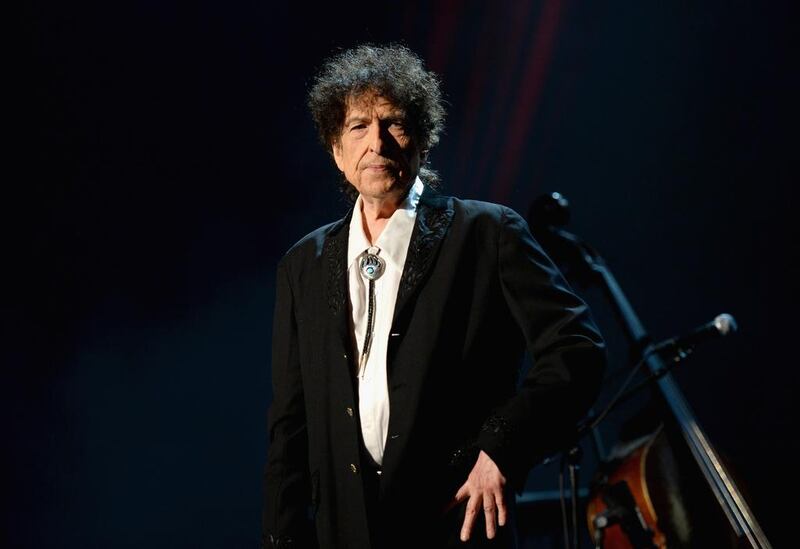When considering whether song lyrics count as literature, there are two groups of people you most definitely should not ask.
The first is teenage boys who painstakingly write out the songs from favourite bands before subjecting them to forensic examination for timeless truths and the meaning of life.
The second is novelists. They generally feel so short-changed by modern culture that they are secretly annoyed when poets and short-story writers win literary awards. So when musician Bob Dylan was awarded the 2016 Nobel Prize for Literature – the first musician since the Hindi polymath Rabindranath Tagore in 1913 – there was a distinct danger they might swallow their own tongues in collective fury.
Dylan will “receive” the award in Stockholm tomorrow, at a ceremony he, characteristically, will not attend. While not all novelists were bitter – Stephen King, Joyce Carol Oates and Salman Rushdie were quick to offer congratulations – others were less impressed, including Hari Kunzru, Gary Shteyngart, Irvine Welsh and Jodi Picoult.
“Does this mean I can win a Grammy?” asked Picoult, perhaps imagining that her romantic novels might make good songs.
Of course, most of the people happy for Dylan are fans. He has sold more than 154 million records that energised one generation and engaged the one that followed, helping to provide the soundtrack to countless lives, especially creatives. So it is understandable that many people are happy for his win – but the question remains: are song lyrics really literature?
The Swedish Academy tried to pre-empt that question with the slippery observation that Dylan “created new poetic expressions within the great American song tradition”. OK, but does being poetic make them poetry? If Dylan isn’t a poet, he sure looks like one. He has spent his life playing with forms and linguistic registers, with time, voice and perspective, publicly using creative language to tweak, question and cajole – “still searching”, as the US president Barack Obama put it, “for that little bit of truth”.
The initial force of Dylan’s music came from his creative innovation of juxtaposing artistic tropes, the distinctively 20th-century art of surrealism – the almost dreamlike bombardment of the individual by disconnected images – with much older folk traditions of storytelling. If that does not seem so unusual now, it is because we are all living in Dylan’s shadow.
You can make a powerful case for the literary quality of Dylan’s work, as with that of other great pop and rock lyricists, such as Leonard Cohen, Nick Cave, Lou Reed, Tom Waits, Bruce Springsteen and even Eminem.
Cohen, who died at the age of 82 last month, reversed the relationship between words and melody. He set his poems to music, the way classical composer Franz Schubert set German poems to music to create his lieder.
There is obviously a deep, long-standing relationship between literature and music. The western canon began with the singers of ancient Greece, with Homer composing epic verses about the fall of Troy in rhyming couplets that could be more easily memorised and performed by wandering bards carrying lyres (essentially, iron-age guitars). Before it was literature, the Iliad was a song.
But read any of Dylan’s published lyrics and you’ll see what I first saw when writing out the words to Jim Morrison’s song in high school – lyrics lose life upon the page. They are a like a fish hauled iridescent from the water to lie greying on the deck.
There is a world of difference between encountering "And the only sound that's left/ After the ambulances go/Is Cinderella sweeping up/ On Desolation Row" written down, and in its natural environment as part of Dylan's harrowing 1965 song, Desolation Row.
The truth is that to be fully alive, lyrics need music, while poetry makes its own.
“Songs are strung upon sound,” said Glyn Maxwell, “poems upon silence.”
He is a poet, and so might be biased, but I think he’s right.
Even if lyrics are not poetry, however, surely literature is larger and more generous than the genres into which it can be reduced? Is not part of the point of literature that it is humanity’s best and most all-embracing version of itself – shouldn’t literature always, given the choice, err on the side of inclusion?
Homer’s songs transcended their origins to become something richer and more forceful, contributing in sometimes unseen ways to how entire cultures understand themselves. Dylan has done something similar.
Does this mean other lyricists should have a shot at the Nobel Prize? What about film scripts or radio plays or digital storytelling in all its forms?
Sure, put them in the line-up. After all, Winston Churchill won the Nobel Prize for Literature in 1953, partly for what the Swedish committee called the literary qualities of his speeches and “brilliant oratory in defending exalted human values”. Did novelists worry that after Churchill, politicians would win all their prizes? That has not happened.
You would expect the next musician to win a Nobel Prize to have delivered a lifetime of irreducible, undeniable, culture-impacting work. You would expect it to contain, as Dylan said of Woody Guthrie, “the infinite sweep of humanity”.
Not many politicians led a country to victory in a war against the Nazis. But then, not many musicians are Bob Dylan.
artslife@thenational.ae





